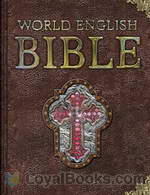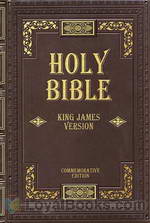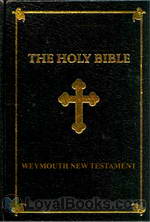|
Books Should Be Free Loyal Books Free Public Domain Audiobooks & eBook Downloads |
|
|
Books Should Be Free Loyal Books Free Public Domain Audiobooks & eBook Downloads |
|
Top Authors |
|---|
Book type:
Sort by:
|
By: Unknown | |
|---|---|
 World English Bible (WEB) - Matthew
World English Bible (WEB) - Matthew
The World English Bible (also known as WEB) is a public domain translation of the Bible that is currently in draft form. Work on the World English Bible began in 1997 and was known as the American Standard Version 1997. The New Testament is considered complete and is available in print.The World English Bible project was started to produce a modern English Bible version that is not copyrighted, does not use archaic English (such as the KJV), or is not translated in Basic English (such as the Bible In Basic English)... | |
 The Bible, American Standard Version (ASV) - Genesis
The Bible, American Standard Version (ASV) - Genesis
The Bible was first translated into English some time in the 7th century by an unnamed monk known to us as the Venerable Bede. This was the Old English version and the work of translation from Vulgate Latin into Middle English was taken up again in the 14th century by the famous religious dissenter John Wycliffe. Modern translations date from the 16th century onwards and these were sourced from Greek and Hebrew versions as well as Latin. Most translations are made by a large group of scholars and a committee is set up to review and modify the work as required... | |
 The Bible, King James Version (KJV) - Introduction
The Bible, King James Version (KJV) - Introduction
Variously known as the Greatest Story Ever Told, The Book of Books and many other names, the Bible is reputed to be the biggest bestseller of all time. Translated into thousands of world languages and studied, worshiped and revered in the four corners of the earth, the Bible remains Christianity's canonical text and is considered the Word of God. The King James Version (KJV) is a translation commissioned by the Church of England in 1604 and the work continued till 1611. However, it wasn't the first translation into English from the original Hebrew, and some portions in Aramaic... | |
 The Bible, Weymouth New Testament (WNT) - Matthew
The Bible, Weymouth New Testament (WNT) - Matthew
The Weymouth New Testament ("WNT"), otherwise known as The New Testament in Modern Speech or The Modern Speech New Testament, is a translation into "modern" English as used in the nineteenth century from the text of The Resultant Greek Testament by Richard Francis Weymouth from the Greek idioms used in it. It was later edited and partly revised by Reverend Ernest Hampden-Cook in London, England. Publishers: Baker and Taylor Company (New York) in 1903 and James Clarke & Co (London) in 1903.Richard Francis Weymouth's popular translation of the New Testament into English was first published in 1903 and has been in print through numerous editions ever since with millions of copies sold... | |
By: A Highland Seer | |
|---|---|
 Tea-Cup Reading and Fortune-Telling by Tea Leaves
Tea-Cup Reading and Fortune-Telling by Tea Leaves
Reading the Cup is essentially a domestic form of Fortune-telling to be practiced at home, and with success by anyone who will take the trouble to master the simple rules laid down in these pages: and it is in the hope that it will provide a basis for much innocent and inexpensive amusement and recreation round the tea-table at home, as well as for a more serious study of an interesting subject, that this little guide-book to the science is confidently offered to the public. | |
By: A. J. Glinski (1817-1866) | |
|---|---|
 Polish Fairy Tales
Polish Fairy Tales
These are selections from a large collection made by A. J. Glinski, printed at Wilna in 1862. These fairy tales come from a far past and may even date from primitive times. They represent the folklore current among the peasantry of the Eastern provinces of Poland, and also in those provinces usually known as White Russia. They were set down by Glinski just as they were related to him by the peasants. In the translation it was of course necessary to shorten them considerably; the continual repetition—however quaint and fascinating in the original—cannot easily be reproduced... | |
By: Adelbert von Chamisso (1781-1838) | |
|---|---|
 wonderful History of Peter Schlemihl, the Man who lost his Shadow
wonderful History of Peter Schlemihl, the Man who lost his Shadow
Peter Schlemihl is an ordinary man until one day he bargains with the devil: He trades his shadow for a bottomless purse. While this sounds like a good idea at first, it turns out that having no shadow is considered to be so strange by society, that even unlimited wealth cannot repair such a fault. The story of Peter Schlemihl is exceedingly well-known even today, but the original text is not so widely-read as it once was. This very accessible translation by F.H. Hedge may be a good introduction to modern listeners. - Summary by Carolin | |
By: Aeschylus (c. 525/524-456/455 BC) | |
|---|---|
 Prometheus Bound (Buckley Translation)
Prometheus Bound (Buckley Translation)
"Prometheus Bound" is the only complete tragedy of the Prometheia trilogy, traditionally assumed to be the work of Aeschylus. Jupiter has turned against Prometheus for protecting mankind and has ordered him to be chained to a rock. But Prometheus is comforted by his knowledge of a way to bring about the downfall of Jupiter. | |
 Prometheus Bound (Browning Translation)
Prometheus Bound (Browning Translation)
Whether or not it was actually written by Aeschylus, as is much disputed, "Prometheus Bound" is a powerful statement on behalf of free humanity in the face of what often seem like the impersonal, implacable Forces that rule the Universe. As one of the most compelling rebel manifestos ever composed, it has appealed not only to the expected host of scholars of Greek drama, but also to a fascinatingly free-spirited array of translators, especially since the early 19th century; Percy Bysshe Shelley, Henry David Thoreau, and activist-poet Augusta Webster are among those who have tried their poetic and linguistic powers at rendering it into English... | |
 Persians
Persians
This is one of the few Greek tragedies that deals with historical events rather than mythological ones. The elders of the Persian court await new of the outcome of the Battle of Salamis, and mourn when they find that their king, Xerxes, has lost to the Greeks. | |
 Libation-Bearers (Morshead Translation)
Libation-Bearers (Morshead Translation)
The Oresteia is a trilogy of Greek tragedies written by Aeschylus concerning the end of the curse on the House of Atreus. The name derives from the character Orestes, who sets out to avenge his father's murder. The only extant example of an ancient Greek theater trilogy, the Oresteia won first prize at the Dionysia festival in 458 BC. When originally performed, it was accompanied by Proteus, a satyr play that would have followed the trilogy. Proteus has not survived, however. In all likelihood the term "Oresteia" originally referred to all four plays; today it generally designates only the surviving trilogy... | |
 Prometheus Bound (Thoreau Translation)
Prometheus Bound (Thoreau Translation)
Whether or not it was actually written by Aeschylus, as is much disputed, "Prometheus Bound" is a powerful statement on behalf of free humanity in the face of what often seem like the impersonal, implacable Forces that rule the Universe. As one of the most compelling rebel manifestos ever composed, it has appealed not only to the expected host of scholars of Greek drama, but also to a fascinatingly free-spirited array of translators, especially since the early 19th century; Percy Bysshe Shelley, Elizabeth Barrett Browning (two very different versions), and activist-poet Augusta Webster are among those who have tried their poetic and linguistic powers at rendering it into English... | |
 Suppliant Maidens (Morshead Translation)
Suppliant Maidens (Morshead Translation)
The Suppliants, also called The Suppliant Maidens, or The Suppliant Women, is a play by Aeschylus. It was probably first performed sometime after 470 BC. It was long thought to be the earliest surviving play by Aeschylus due to the relatively anachronistic function of the chorus as the protagonist of the drama. However, evidence discovered in the mid-20th century shows it one of Aeschylus' last plays, definitely after The Persians and possibly after Seven Against Thebes....The Danaids form the chorus and serve as the protagonists... | |
 Persians (version 2)
Persians (version 2)
The earliest of Aeschylus' plays to survive is "The Persians" (Persai), performed in 472 BC and based on experiences in Aeschylus's own life, specifically the Battle of Salamis. It is unique among surviving Greek tragedies in that it describes a recent historical event. "The Persians" focuses on the popular Greek theme of hubris by blaming Persia's loss on the pride of its king. It is the second and only surviving part of a now otherwise lost trilogy that won the first prize at the dramatic competitions in Athens’ City Dionysia festival in 472 BCE, with Pericles serving as choregos... | |
 Agamemnon (Morshead Translation)
Agamemnon (Morshead Translation)
The Oresteia is a trilogy of Greek tragedies written by Aeschylus concerning the end of the curse on the House of Atreus. The name derives from the character Orestes, who sets out to avenge his father's murder. The only extant example of an ancient Greek theater trilogy, the Oresteia won first prize at the Dionysia festival in 458 BC. When originally performed, it was accompanied by Proteus, a satyr play that would have followed the trilogy. Proteus has not survived, however. In all likelihood the term "Oresteia" originally referred to all four plays; today it generally designates only the surviving trilogy... | |
 Furies (Morshead Translation)
Furies (Morshead Translation)
The Oresteia is a trilogy of Greek tragedies written by Aeschylus concerning the end of the curse on the House of Atreus. The name derives from the character Orestes, who sets out to avenge his father's murder. The only extant example of an ancient Greek theater trilogy, the Oresteia won first prize at the Dionysia festival in 458 BC. When originally performed, it was accompanied by Proteus, a satyr play that would have followed the trilogy. Proteus has not survived, however. In all likelihood the term "Oresteia" originally referred to all four plays; today it generally designates only the surviving trilogy... | |
 Seven Against Thebes (Way Translation)
Seven Against Thebes (Way Translation)
Seven against Thebes is the third play in an Oedipus-themed trilogy produced by Aeschylus in 467 BC. The trilogy is sometimes referred to as the Oedipodea. It concerns the battle between an Argive army led by Polynices and the army of Thebes led by Eteocles and his supporters. The trilogy won the first prize at the City Dionysia. The trilogy's first two plays, Laius and Oedipus, as well as the satyr play Sphinx, are no longer extant. When Oedipus, King of Thebes, realized he had married his own mother and had two sons and two daughters with her, he blinded himself and cursed his sons to divide their inheritance (the kingdom) by the sword... | |
 Agamemnon (Browning Translation)
Agamemnon (Browning Translation)
The play Agamemnon details the homecoming of Agamemnon, King of Argos, from the Trojan War. Waiting at home for him is his wife, Clytemnestra, who has been planning his murder, partly as revenge for the sacrifice of their daughter, Iphigenia, and partly because in the ten years of Agamemnon's absence Clytemnestra has entered into an adulterous relationship with Aegisthus, Agamemnon's cousin and the sole survivor of a dispossessed branch of the family (Agamemnon's father, Atreus, killed and fed Aegisthus's brothers to Aegisthus's father, Thyestes, when he took power from him), who is determined to regain the throne he believes should rightfully belong to him. | |
By: Aesop (c. 620 BCE-564) | |
|---|---|
 Celebration of Dialects and Accents, Vol 2.
Celebration of Dialects and Accents, Vol 2.
A celebration of all the wonderful dialects and accents found within the Librivox community! The goal being to record a 'phonetically relevant' text by as many volunteers as possible, and make this dialect/accent 'database' available to the world, by releasing the recordings into the public domain. | |
 Aesop's Fables - new translation
Aesop's Fables - new translation
284 fables on a wide range of subjects, written by the famous author Aesop. | |
 Aesop for Children
Aesop for Children
A collection of Aesop's fables for children from the classic American book illustrated by Milo Winter. Read along and see the illustrations at: http://www.gutenberg.org/ebooks/19994. | |
 Aesop's Fables: A New Revised Edition
Aesop's Fables: A New Revised Edition
Remember the story of the Ant and the Grasshopper? the Fox and the Sour Grapes? The Boy who Cried Wolf? These wonderful tales and hundreds more have been passed down to us over the centuries. The man credited with writing them, Aesop, was an Ancient Greek slave born about 620 B.C. Aesop is known as a fabulist or story teller credited with a number of fables shining glaringly true light on our human foibles now collectively known as Aesop's Fables. Although no writings by him survive, numerous tales credited to him were gathered across the centuries and in many languages in a storytelling tradition that continues to this day... | |
By: Albert Payson Terhune (1872-1942) | |
|---|---|
 Bruce
Bruce
Albert Payson Terhune was a journalist but is probably best known as a breeder of dogs, in particular collies at his Sunnybank Kennels. Bruce charts the story of an unwanted puppy who becomes loved by the mistress of the family. He then becomes enlisted as a carrier dog in World War 1, completing heroic tasks and coming home a war hero | |
 Buff: A Collie and Other Dog-Stories
Buff: A Collie and Other Dog-Stories
Buff: A Collie and Other Dog-Stories is one of many popular books written by Albert Payson Terhune that have delighted dog lovers for decades. Terhune loved dogs, and he bred and raised collies at his Sunnybank Kennels. Terhune sometimes included difficult passages in his stories, and he did not always conclude with the typical "happy ending"--but his passion for dogs was always clearly evident in his novels. An excerpt from the Foreword to this book in which Terhune describes the nature of a dog: "Service that asks no price; forgiveness free For injury or for injustice hard. Stanch friendship, wanting neither thanks nor fee Save privilege to worship and to guard:--That is their creed." | |
 Lad: A Dog
Lad: A Dog
Lad: A Dog is a 1919 American novel written by Albert Payson Terhune and published by E. P. Dutton. Composed of twelve short stories first published in magazines, the novel is based on the life of Terhune's real-life rough collie, Lad. Born in 1902, the real-life Lad was an unregistered collie of unknown lineage originally owned by Terhune's father. Lad's death in 1918 was mourned by many of the story's fans, particularly children. | |
 Superwomen
Superwomen
In this 1916 work, Albert Payson Terhune introduces twelve immensely influential women, whose actions influenced world history. Terhune chooses well-known figures whose stories are as much myth as history, like Cleopatra and Helen of Troy, artists such as George Sand, and a number of ladies whose names are not so well-known today, because their work was not immediately visible to the uninitiated. All stories will be interested to the modern feminist, and each reader and listener should be able to find a personal heroine among these select twelve. - Summary by Carolin | |
 Treve
Treve
Treve is a gloriously beautiful and madly alive collie that finds himself, through a series of lucky and unlucky events, on a sheep ranch in the West. He is owned by the two bosses of the ranch, and he finds his way into the heart of each of these very different partners. Treve's life is filled with one adventure after another. - Summary by jjschmidt | |
 Heart of a Dog
Heart of a Dog
Dogs! Many of us love them and they love us unconditionally. But is he a soft teddy bear or a ferocious guard dog? | |
By: Alexander Hamilton (1755/1757-1804) | |
|---|---|
 Federalist Papers (version 2)
Federalist Papers (version 2)
“The Federalist Papers” are a collection of 85 linked essays that explain the construction of the U.S. government and why it was built that way. The Papers are regarded as the best pipeline into understanding the U.S. Constitution and the founding principles of the government it would establish. I have endeavored here to present these essays, not as articles in a newspaper, but as you might have experienced them if you had sat in a comfortable tavern with a tankard in hand, and listened while these ardent men ranged in front of a friendly fireplace as they attempted to convince you of their arguments... | |
By: Alexander Hunter (1843-1914) | |
|---|---|
 Johnny Reb and Billy Yank
Johnny Reb and Billy Yank
Johnny Reb & Billy Yank is an epic novel first published in 1905 by Alexander Hunter, a soldier who served in Confederate General Robert E. Lee's Army from 1861 to 1865. The novel is noted for encapsulating most of the major events of the American Civil War, due to Hunter's obvious involvement in them. The "novel" is actually pulled from Hunter's own diaries during the war. He explains his reasons for publishing his accounts in the preface to the novel- "There were thousands of soldiers on both sides during the Civil War, who, at the beginning, started to keep a diary of daily events, but those who kept a record from start to finish can be counted on the fingers of one hand... | |
By: Alexandre Chatrian (1826-1890) | |
|---|---|
 Stories of the Rhine
Stories of the Rhine
Émile Erckmann and Alexandre Chatrian, more widely known by their joint nom de plume Erckmann-Chatrian, were in their time more recognized and known locally for their militaristic historical fiction. But of perhaps a more long-lasting influence was their strange and fantastical stories of the macabre where one imagines they were influenced by fellow weird writer E. T. A. Hoffmann of whom many of their stories strikes a similar feel. Noted horror authors such as M. R. James and H. P. Lovecraft have at times professed to have been fans of their work as well... | |
By: Allan Monkhouse (1858-1936) | |
|---|---|
 Mary Broome
Mary Broome
Before Downton Abbey, there was Mary Broome. In Allan Monkhouse's 1911 satire, when the son of a middle-class household gets their housemaid pregnant, the two families must try to combine their very different values. | |